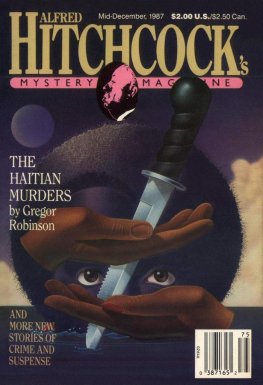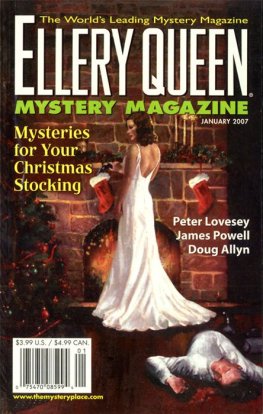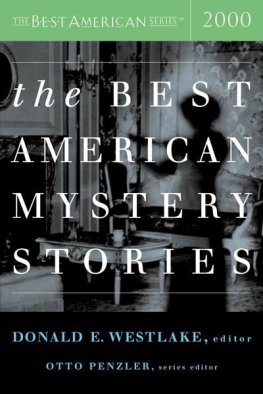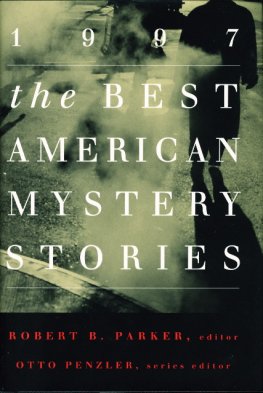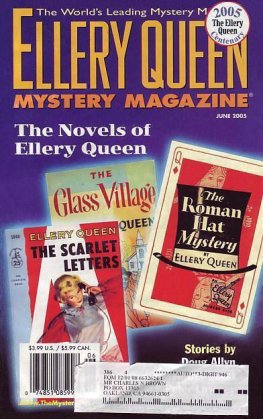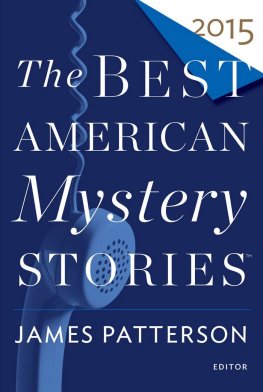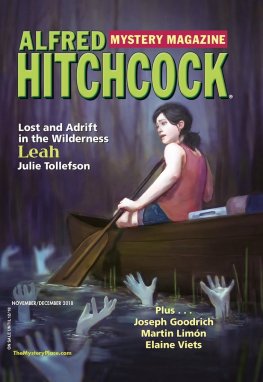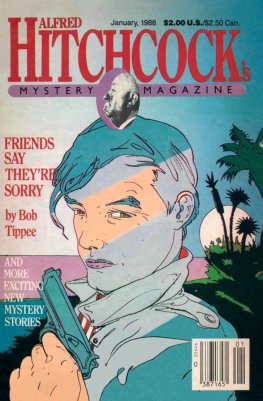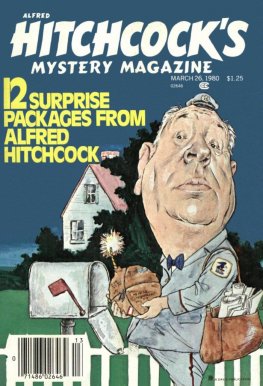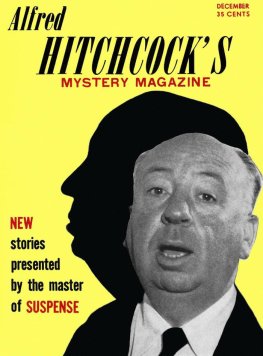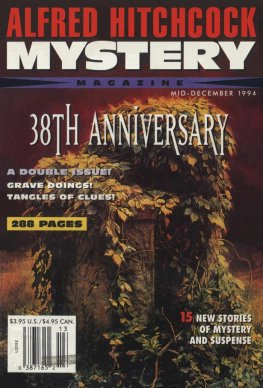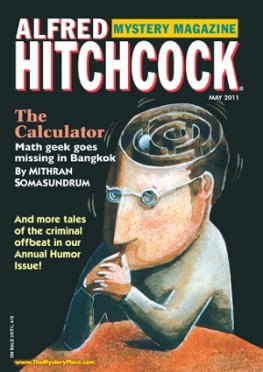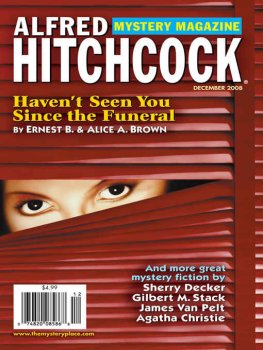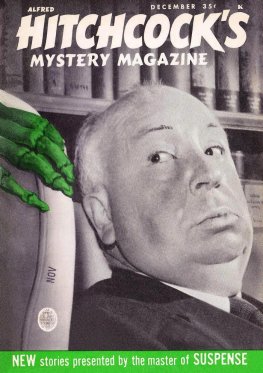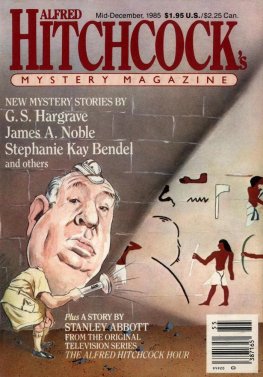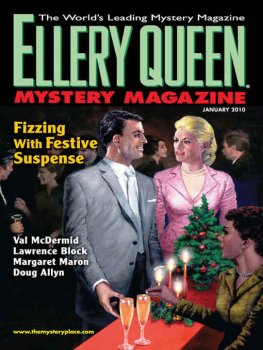Doug Allyn - Alfred Hitchcock’s Mystery Magazine. Vol. 32, No. 13, Mid-December, 1987
Here you can read online Doug Allyn - Alfred Hitchcock’s Mystery Magazine. Vol. 32, No. 13, Mid-December, 1987 full text of the book (entire story) in english for free. Download pdf and epub, get meaning, cover and reviews about this ebook. City: New York, year: 1987, publisher: Davis Publications, genre: Detective and thriller. Description of the work, (preface) as well as reviews are available. Best literature library LitArk.com created for fans of good reading and offers a wide selection of genres:
Romance novel
Science fiction
Adventure
Detective
Science
History
Home and family
Prose
Art
Politics
Computer
Non-fiction
Religion
Business
Children
Humor
Choose a favorite category and find really read worthwhile books. Enjoy immersion in the world of imagination, feel the emotions of the characters or learn something new for yourself, make an fascinating discovery.
- Book:Alfred Hitchcock’s Mystery Magazine. Vol. 32, No. 13, Mid-December, 1987
- Author:
- Publisher:Davis Publications
- Genre:
- Year:1987
- City:New York
- ISBN:0002-5224
- Rating:5 / 5
- Favourites:Add to favourites
- Your mark:
- 100
- 1
- 2
- 3
- 4
- 5
Alfred Hitchcock’s Mystery Magazine. Vol. 32, No. 13, Mid-December, 1987: summary, description and annotation
We offer to read an annotation, description, summary or preface (depends on what the author of the book "Alfred Hitchcock’s Mystery Magazine. Vol. 32, No. 13, Mid-December, 1987" wrote himself). If you haven't found the necessary information about the book — write in the comments, we will try to find it.
Alfred Hitchcock’s Mystery Magazine. Vol. 32, No. 13, Mid-December, 1987 — read online for free the complete book (whole text) full work
Below is the text of the book, divided by pages. System saving the place of the last page read, allows you to conveniently read the book "Alfred Hitchcock’s Mystery Magazine. Vol. 32, No. 13, Mid-December, 1987" online for free, without having to search again every time where you left off. Put a bookmark, and you can go to the page where you finished reading at any time.
Font size:
Interval:
Bookmark:
Alfred Hitchcocks Mystery Magazine. Vol. 32, No. 13, Mid-December, 1987

Editors notes
by Cathleen Jordan
Want to try solving a real-life mystery? Weve got a good one for you thats been puzzling us for about a year now. In August 1986 some friends who own a weekend house in the country on an isolated, heavily wooded mountainside in New York arrived one Friday evening to find that someone had come calling, Goldilocks-style, in their absence. Only these folks, on the whole, were considerably neater than Goldilocks; in fact, they seemed to have a passion for cleanliness (see the list below). Nor were they regulation burglars in other ways. Left untouched were the TV, the stereo, the Nikon camera in short, almost everything of real value. They did take the following:
four coffee cups (leaving two in the cupboard), but no saucers, and none of the coffee mugs
all the toothbrushes (there were four)
all soap, detergent, Clorox, SOS pads, toothpaste, razor blades, shaving soap
all plastic garbage bags, paper towels, paper napkins, toilet paper, boxes of Kleenex
all the flashlight batteries (but not the flashlights)
beer and some inexpensive wine, leaving behind good wine and liquor
all the canned goods and frozen food
several unopened boxes of pasta, but not the opened ones
all the coffee but no tea
two coffee cans of bacon drippings from the refrigerator
several bath towels and hand towels, no sheets
Other clues? They took showers there were wet towels in the bathroom and washed clothes. The evidence for that was threefold: a pair of boys briefs, size 12, found behind the washing machine; an empty box of Clorox, ditto; and at least two loads worth of lint in the dryer (our friends clean the lint out after each use). They did take one pair of good winter boots, size 10 medium, the only really expensive thing that was gone. They tossed several beer cans onto the lawn (drunk while waiting for the washing to get done?) and left behind a telltale odor of cigarette smoke but no cigarette butts or other trash was found in the house. They broke a previously opened bottle of pasta sauce (a small stain was found on the kitchen rug) and put the bits of glass and sauce-stained paper towels used to wipe it up under the deck of the house. And they took an old set of mens running clothes but left behind a large supply of other clothes. Everything except the beer cans and broken sauce bottle was left in perfect order; dust cloths over furniture (from the drawers of which items like paper napkins had vanished) were in place. They did, however, eat three leftover blueberry muffins from an Entenmanns box in the refrigerator and put back the empty box. There was no sign of forced entry, though its possible they found a key hidden on the property (and still in its hiding place when our friends arrived).
Campers making a pit stop? But toothbrushes? And cups but not saucers or mugs? The local constabulary just shook their heads.
Anybody out there have any ideas? Let us know what you come up with; well print as many of your replies and ingenious solutions as we can in a future issue.
The Haitian Murders
by Gregor Robinson

The first victim was one of the itinerants who lived in the bush at the southern end of the island. People in the village knew him because they had sometimes seen him at the ferry dock, helping tourists with their luggage. Occasionally he had been noticed visiting Madame Dell, who lived with her sultry stepdaughter in a neat little house behind the Majestic Hotel. I had seen him in the village once or twice myself. He had walked with a swagger and worn a bright red bandana. He looked about twenty years old. Apart from that no one knew much about him, for the gulf between the expatriate community and the refugees was total; even the villagers had little to do with the Haitians.
And because the dead man was a refugee nobody paid much attention. Probably a squabble over rum, said Burnett when he came into the bank a day or two after the body had been found. The Royal Bahamian Defence Force showed little interest in the matter because the Haitians were not generally involved in the drug trade; you could see that from the poor circumstances in which they lived: they had none of the shiny new boats and fancy clothes of the young men who frequented the Riverside Bar. Besides, the murder had been done with a knife the long draw of a serrated edge across the throat and not with the submachine guns and stubby-nosed pistols favored by the Colombian shippers and their island associates.
The body was found near a trail running through the gumwood trees to the swamp they called Fish Mangrove, a dark miasmic place where many of the illegals first came ashore. Half earth, half lagoon, it made a good spot for the little boats to land unseen and unheard. The villagers seldom went there, the expatriates never. People sometimes used the paths that wound through the swamp for courting and sexual liaison. The body had in fact been found by a tourist, someone from the hotel exploring the island.
The dead mans name was Pierre, and he had lived in a hut on a corner of Burnetts property, out where the bush was slowly taking over the last of the citrus plantations. Burnett was the last grower on the island still making a go of fruit farming. He was pouring money into the thing, but it didnt matter; he was rich, a tax exile, glad to be living in the tropics and under the protection of the Bahamian bank laws.
Constable MacMahon had been out to see him the day after the murder was discovered.
I knew Pierre, of course, Burnett said he had come into the bank first thing expressly to tell me this but he didnt work for me. Not regularly anyway. He helped out with big jobs once in a while, repaired my river pier last spring. But Tommas, the poet, hes the one works for me. A lot of them live out there, you know. Some actually on my property, some not. I told Constable MacMahon he was quite welcome to go out and have a look around. When he came back to the house afterwards walked right through my bloody papayas he said hed be coming to see you. Dont know why.
Murder investigation is not the kind of thing in which I am usually involved its the last thing the regional head office would want; it might upset the more discreet element of our clientele and I hoped Constable MacMahon would not turn up. But he ambled into the bank that afternoon just before closing time. He was a very large man. Even though he had been born and lived in the islands all his life, he seemed never to have got used to the heat. He was sweating heavily. He was our only policeman.
Recognize this?
He threw onto my desk a bank passbook. I saw the plastic cover with the address of the local branch embossed on the front, put there with the stamping machine we had acquired in Nassau at great expense. But I could not remember every passbook, every customer, every time someone came into the bank.
Constable MacMahon said the passbook belonged to the dead man. I found it on a shelf above his bed, he said. He looked at me and waited.
You need a court order for me to open bank records, I said.
You tell me if I should bother getting one, said Constable MacMahon.
This was murder, and I hesitated for only a moment. While I was looking through the files I asked Constable MacMahon what he thought had happened.
Well, its not suicide. An example of the mans humor. He removed his hat and wiped the top of his large pale head with a handkerchief.
Font size:
Interval:
Bookmark:
Similar books «Alfred Hitchcock’s Mystery Magazine. Vol. 32, No. 13, Mid-December, 1987»
Look at similar books to Alfred Hitchcock’s Mystery Magazine. Vol. 32, No. 13, Mid-December, 1987. We have selected literature similar in name and meaning in the hope of providing readers with more options to find new, interesting, not yet read works.
Discussion, reviews of the book Alfred Hitchcock’s Mystery Magazine. Vol. 32, No. 13, Mid-December, 1987 and just readers' own opinions. Leave your comments, write what you think about the work, its meaning or the main characters. Specify what exactly you liked and what you didn't like, and why you think so.

